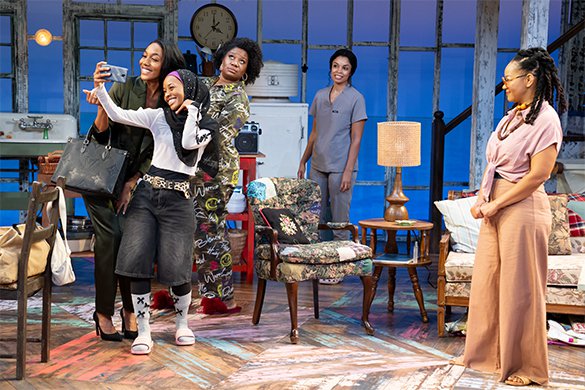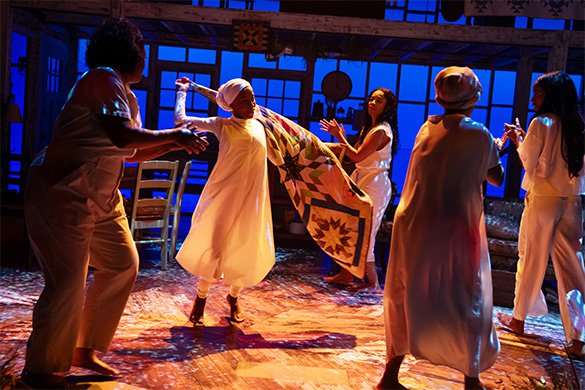
A family gathers to continue work on their quilts in Katori Hall play at Lincoln Center (photo by Julieta Cervantes)
THE BLOOD QUILT
Lincoln Center Theater at the Mitzi E. Newhouse
150 West 65th St. between Broadway & Amsterdam Ave.
Through December 29
www.lct.org
Pulitzer Prize winner Katori Hall explores the multiple meanings of “blood,” both literal and metaphorical, in the overstuffed, overlong yet poignant and moving The Blood Quilt at Lincoln Center’s Mitzi E. Newhouse Theater.
The 160-minute play (including intermission) takes place in a seafront cabin on the fictional Georgia island of Kwemera, inspired by Sapelo Island, home to such Gullah-Geechee communities as Hog Hammock, where descendants of enslaved West Africans made their homes and still reside. According to one character, the name Kwemera, in “that old old Geechee tongue, means ‘to last. To endure. To withstand.’ Like the Jernigan women. Like these quilts. Ever since we was brought here, we done made a
quilt every year. Some been lost to fire, hurricanes, war. Sometimes stolen by need, oftentimes stolen by want. It’s over one hundred quilts in this house that tell that Jernigan story.”
In addition, in the Kurundi language of the East African nation of Burundi, Kwemera is defined as “to agree to, to admit, to confess, to believe in.” Both the Geechee and Kurundi meanings come to the fore in the play.
It’s 2015, and the Jernigan matriarch, Mama Redell, has just passed away, buried in the traditional way in the sea. Her four daughters, each from a different father, gather at the cabin to continue the family quilting ritual, which goes back generations, to “great, great, great, great, great, great grandmama Yahaya, the first one, ‘the unruly one.’”
The house is run by Clementine (Crystal Dickinson, though I saw understudy Lynnette R. Freeman), the oldest daughter, who has sacrificed her personal life to take care of their mother. In the script she is referred to as the “piece keeper,” attempting to maintain peace among the sisters like a patchwork quilt that comes together in the end.
The bold and abrasive Gio (Adrienne C. Moore) is a police officer who is having difficulties with her husband, Red. Cassan (Susan Kelechi Watson) is an army nurse whose husband, Chad, is out on yet another tour; she arrives with their fifteen-year-old daughter, Zambia (Mirirai), who is trying to find her own identity, referring to herself as an activist, wearing a hijab, and ready to affirm her sexuality, as her mother and aunts prepare to welcome her into their quilting circle. The youngest daughter, Amber (Lauren E. Banks), is a stylish, single entertainment lawyer who apparently was too busy to attend their mother’s funeral.
Each name is important. For example, clementine can be a seedless citrus fruit, a symbol of generosity, and, in Latin, “the gentle one”; Chad and Zambia are countries in Africa; cassan means “path” or “thoroughfare”; Gio can mean “origin,” “history,” or “G-d is gracious”; amber is a fossilized substance that traps the past and also is a symbol of protection and purification; and Red and Redell evoke the color of blood.
“The blood remember, don’t it,” Gio says. “It remember yo’ history for you even when they erase it from they books.” Meanwhile, Amber asks her sisters, “Do you really think a color will keep out evil? Or that ‘red is warning’?”
When Amber pulls Mama Redell’s unexpected will out of a cookie jar and she reads what was left to whom, the fighting between the siblings only intensifies as they debate the legacy of the quilts.

Sisters share a rare moment of delight in Katori Hall’s The Blood Quilt (photo by Julieta Cervantes)
Adam Rigg’s lovely wood-based set features inviting projections of water and clouds by Jeanette Oi-Suk Yew and numerous spectacular quilts, many loaned by the Brooklyn Quilters Guild. The tight-knit ensemble and Lileana Blain-Cruz’s (Anatomy of a Suicide, Fefu and Her Friends) expert direction make the audience feel like flies on the wall, listening in on private conversations. Moore (or colored girls who have considered suicide / when the rainbow is enuf, The Taming of the Shrew) and Banks (This Land Was Made, City on a Hill) stand out in the talented cast.
In such previous works as The Hot Wing King, Our Lady of Kibeho, and Hurt Village, Hall has shown her skill at developing strong characters in tense situations. However, in The Blood Quilt, she can’t quite stop stitching, adding too many subplots that unnecessarily complicate the already complex relationships among the sisters. She throws in just about everything — including the kitchen sink.
There’s also an odd moment when Zambia offers to perform some monologues for Amber, including one from Hurt Village. Not everyone might know that it is one of Hall’s earlier plays, but it took me out of the fictional world of the Jernigan clan, and that’s rarely a good thing in a hard-hitting drama.
At one point, Clementine explains to Amber, “Mama used to say, to get a bloodstain out you just rub it with your spit. It’ll take the stain right out. Take your saliva and rub the stain.”
If only it were that easy with a play.
[Mark Rifkin is a Brooklyn-born, Manhattan-based writer and editor; you can follow him on Substack here.]